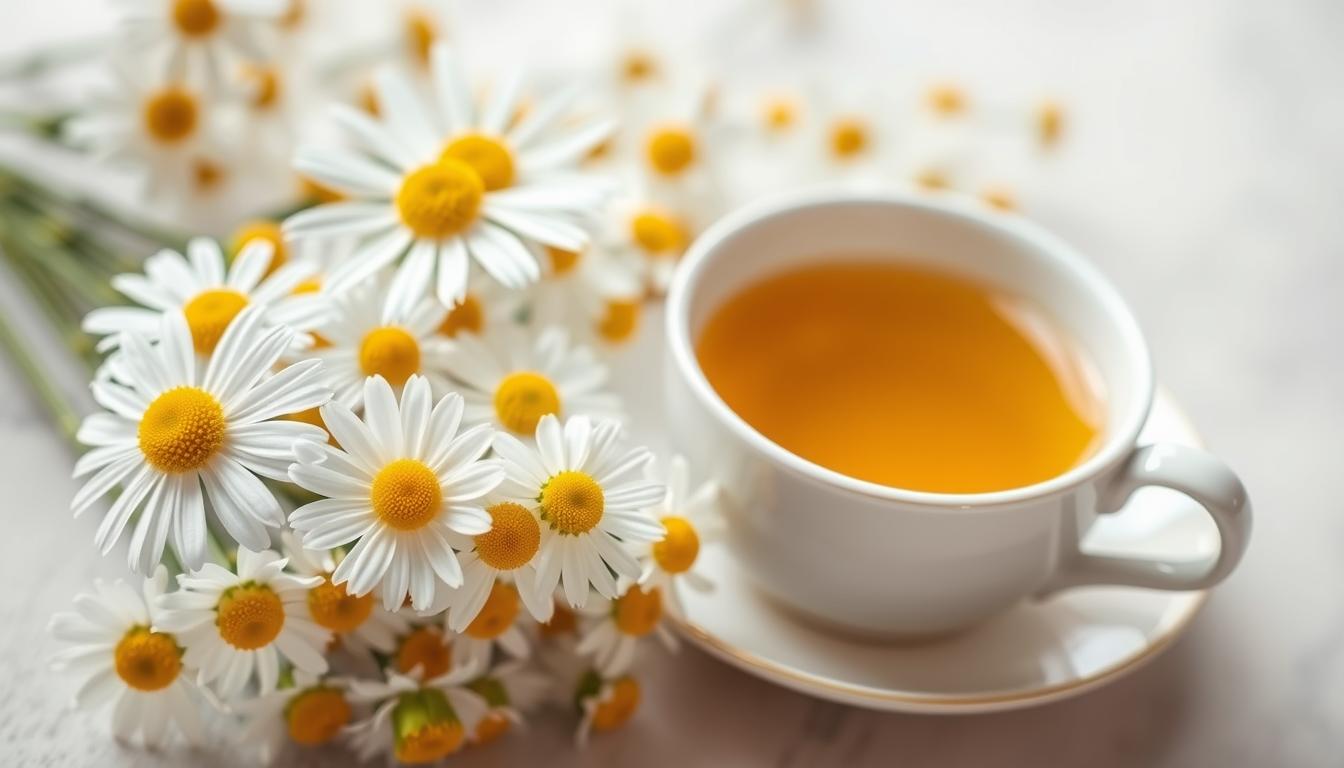Did you know that over 1 million cups of herbal beverages are consumed daily in the U.S.? Among these, chamomile stands out as a favorite for its calming effects. But one question often arises: Does chamomile tea have caffeine?
Chamomile tea is a naturally caffeine-free herbal drink, making it a perfect choice for those looking to unwind without the buzz. Derived from the daisy family, this soothing beverage has been cherished for centuries for its relaxing properties.
In this article, we’ll explore the science behind chamomile’s caffeine-free nature, its traditional uses, and how it can fit into your daily routine. Whether you’re new to drinking chamomile or a long-time fan, you’ll discover why this herbal tea remains a global favorite.
Key Takeaways
- Chamomile tea is naturally free of caffeine.
- It belongs to the daisy family and is known for its calming effects.
- This herbal beverage has been used for centuries for relaxation.
- It’s a great option for those avoiding caffeine in their daily routine.
- Chamomile tea is widely enjoyed around the world for its soothing qualities.
Introduction to Chamomile Tea and Its History
The history of chamomile dates back to ancient civilizations, where it was revered for its medicinal benefits. This herb, belonging to the daisy family (Asteraceae), has been used for centuries to promote relaxation and overall health. Its delicate, daisy-like flowers have made it a symbol of calm and healing across cultures.

In ancient Egypt, chamomile was dedicated to the sun god Ra and used in skincare and medicinal preparations. The Greeks and Romans also valued this plant, using it to soothe anxiety and settle stomachs. Its widespread use highlights its enduring appeal as a natural remedy.
Chamomile in Traditional Medicine
Chamomile has long been a cornerstone of traditional medicine. Its calming properties made it a popular choice for treating insomnia and stress. Historical records show it was often brewed as a tea or applied topically to heal skin irritations.
Modern research supports many of these traditional benefits. Studies suggest chamomile may help with digestion, reduce inflammation, and even improve sleep quality. Its versatility as a supplement continues to make it a trusted herb in holistic health practices.
Diverse Varieties of Chamomile
Chamomile comes in two main varieties: German and Roman. While both share similar properties, they differ slightly in appearance and flavor. German chamomile (Matricaria chamomilla) is more commonly used in tea, while Roman chamomile (Chamaemelum nobile) is often found in skincare products.
| Variety | Appearance | Common Uses |
|---|---|---|
| German Chamomile | Small, daisy-like flowers | Tea, digestive aid |
| Roman Chamomile | Low-growing, feathery leaves | Skincare, aromatherapy |
Chamomile is available in various forms, including loose-leaf tea, capsules, and creams. Whether you prefer a warm cup of tea or a soothing lotion, chamomile offers a natural way to enhance your well-being.
Does chamomile tea have caffeine
Many people turn to herbal beverages for their calming effects, and chamomile is a top choice. Unlike traditional teas, this herbal drink is naturally free of caffeine. Its soothing properties make it a favorite for those seeking relaxation without the jitters.

Understanding Its Caffeine-Free Nature
Chamomile’s caffeine-free nature comes from its botanical composition. It is derived from the daisy family, which does not produce caffeine. Instead, it contains apigenin, an antioxidant that promotes relaxation and may aid in sleep.
Research highlights apigenin’s ability to bind to receptors in the brain, reducing anxiety and encouraging restfulness. This makes chamomile an excellent choice for evening use or for those looking to reduce their caffeine intake.
Comparing Herbal and Traditional Teas
Herbal teas like chamomile differ significantly from traditional teas. Traditional teas, such as black or green, come from the Camellia sinensis plant, which naturally contains caffeine. Herbal teas, on the other hand, are made from flowers, leaves, or roots of various plants, making them naturally caffeine-free.
Here’s a quick comparison:
| Type | Source | Caffeine Content |
|---|---|---|
| Chamomile Tea | Daisy family | Caffeine-free |
| Black Tea | Camellia sinensis | High caffeine |
| Green Tea | Camellia sinensis | Moderate caffeine |
While chamomile offers unique benefits, it’s important to note that more research is needed to fully understand its health claims. However, its caffeine-free nature and calming effects make it a reliable choice for relaxation and improved sleep.
Health Benefits and Research on Chamomile Tea
Chamomile has been celebrated for its numerous health benefits, backed by both tradition and modern research. From promoting relaxation to aiding digestion, this herbal remedy offers a range of advantages. Let’s explore the science behind its effects.
Stress Relief and Improved Sleep
One of the most well-known benefits of chamomile is its ability to reduce anxiety and improve sleep. The antioxidant apigenin plays a key role in this process. It binds to receptors in the brain, promoting relaxation and restfulness.
A study found that participants who consumed chamomile experienced better sleep quality. This makes it a popular choice for those struggling with insomnia or stress-related sleep issues.
Digestive and Anti-inflammatory Properties
Chamomile has long been used to soothe digestive discomfort. Its anti-inflammatory properties help calm the stomach and reduce bloating. Research suggests it may also ease symptoms of irritable bowel syndrome (IBS).
Additionally, chamomile’s anti-inflammatory effects extend beyond digestion. It has been shown to reduce skin irritation and minor wounds when applied topically.
Antioxidants and Potential Disease Prevention
The antioxidants in chamomile, including apigenin, contribute to its potential in preventing diseases. These compounds help combat oxidative stress, which is linked to chronic conditions like heart disease and diabetes.
Emerging research indicates that chamomile may help regulate blood sugar levels, making it a promising supplement for people with diabetes. However, more studies are needed to confirm these findings.
| Benefit | Key Component | Research Findings |
|---|---|---|
| Stress Relief | Apigenin | Reduces anxiety and promotes relaxation |
| Improved Sleep | Apigenin | Enhances sleep quality |
| Digestive Aid | Anti-inflammatory compounds | Eases bloating and IBS symptoms |
| Disease Prevention | Antioxidants | May lower blood sugar and cholesterol |
While chamomile offers many benefits, it’s important to consult a doctor before using it as a supplement, especially if you’re on medication. Its natural properties make it a valuable addition to a healthy lifestyle.
Brewing the Perfect Cup of Chamomile Tea
Brewing chamomile tea is an art that combines simplicity with precision. Whether you’re a seasoned tea drinker or new to this herbal beverage, mastering the process ensures a flavorful and relaxing experience. Let’s explore the best methods to create your ideal cup.
Loose-Leaf vs. Tea Bags
When it comes to chamomile tea, you have two main options: loose-leaf and tea bags. Each form has its unique advantages. Loose-leaf tea often provides a richer flavor and aroma, as it contains whole flowers. Tea bags, on the other hand, are convenient and easy to use, making them perfect for busy days.
| Form | Pros | Cons |
|---|---|---|
| Loose-Leaf | Fuller flavor, higher quality | Requires a strainer or infuser |
| Tea Bags | Quick and easy to use | May contain smaller, less potent pieces |
Step-by-Step Brewing Guide
To brew the perfect cup, follow these steps:
- Boil water to around 200°F (93°C). Avoid over-boiling, as it can affect the flavor.
- Measure 1-2 grams of chamomile per cup. For tea bags, one bag is usually sufficient.
- Place the chamomile in a cup or teapot and pour the hot water over it.
- Steep for 3-4 minutes. Longer steeping can lead to a bitter taste.
- Strain the tea or remove the tea bag. Add honey or lemon for extra flavor if desired.
For the best effect, enjoy your chamomile tea in a calm environment. This allows you to fully appreciate its soothing properties and make the most of its natural benefits.
Additional Uses and Considerations for Chamomile
Chamomile’s versatility extends far beyond its role as a soothing beverage. This herb, known for its calming properties, is also a star ingredient in skincare and aromatherapy. Its gentle nature makes it a favorite for those with sensitive skin, while its sweet, apple-like aroma adds a touch of relaxation to any space.
Skincare Benefits of Chamomile
Chamomile is widely used in skincare products for its soothing and anti-inflammatory properties. Extracted from the flower, chamomile oil is often diluted and added to creams, lotions, and serums. It helps reduce redness, calm irritation, and promote healing for sensitive or acne-prone skin.
Many cosmetic brands include chamomile in their formulations because of its natural ability to nourish and protect the skin. For those who prefer DIY remedies, chamomile can be used in homemade face masks or toners for a gentle, natural glow.
Aromatherapy and Beyond
Chamomile’s calming scent makes it a popular choice for aromatherapy. The oil is extracted by steaming or crushing the flowers, resulting in a sweet, relaxing aroma. When used in diffusers, it creates a peaceful atmosphere, perfect for unwinding after a long day.
Beyond skincare and aromatherapy, chamomile has ecological benefits. Used tea blossoms can be repurposed as fertilizer, enriching the soil and promoting plant growth. This sustainable practice highlights the plant’s versatility and eco-friendly potential.
Why Choose Chamomile?
- Its gentle nature makes it ideal for sensitive skin.
- The soothing aroma promotes relaxation and stress relief.
- It’s a sustainable herb with multiple uses beyond drinking.
Whether you’re sipping chamomile tea, applying it to your skin, or enjoying its scent in a diffuser, this versatile plant offers something for everyone. Its natural benefits and eco-friendly applications make it a valuable addition to any lifestyle.
Conclusion
For centuries, chamomile has been a trusted remedy for relaxation and wellness. This caffeine-free herbal drink offers a natural way to unwind, making it a favorite for those seeking calm without the buzz. Its historical use in traditional medicine highlights its enduring appeal, while modern research supports its benefits for sleep, stress relief, and digestion.
Whether you enjoy it as a warm beverage or use it in skincare and aromatherapy, chamomile’s versatility is unmatched. Brewing the perfect cup is simple, and its soothing effects can enhance your daily routine. For those managing conditions like anxiety or blood sugar levels, it may serve as a helpful supplement.
As you explore the benefits of chamomile, remember to consult a doctor if you’re pregnant, nursing, or giving it to a child. With its calming properties and rich history, chamomile is a wonderful addition to any lifestyle.

